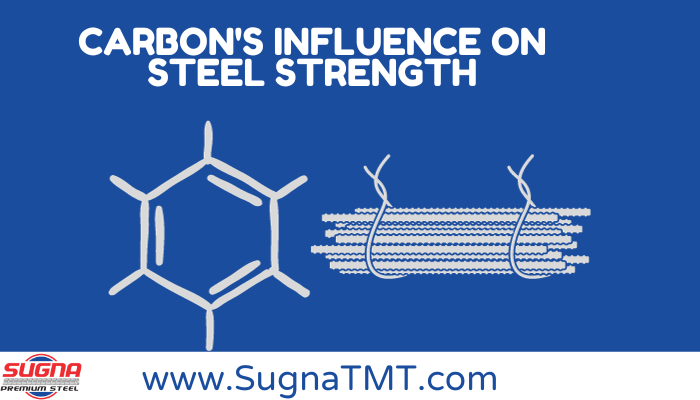Steel, an alloy primarily made up of iron and carbon, is ubiquitous in construction, automobile manufacturing, and numerous other industries. While it’s common knowledge that steel is known for its strength and durability, not everyone understands the critical role carbon plays in determining these properties. In this article, we will dive deep into the impact of carbon on steel’s strength, providing an understanding that underscores the importance of using high-quality materials like Steel TMT Bars in construction.
Table 1: Basic Composition of Steel
| Element | Percentage |
|---|---|
| Iron | 98-99% |
| Carbon | 0.1-2% |
The Carbon-Steel Relationship

Understanding the Basics
Carbon, though present in minute amounts in steel, greatly influences its properties. The percentage of carbon in steel determines its classification and, by extension, its application.
Why Carbon Matters
Carbon atoms, when integrated into the iron matrix, can either be interspersed between iron atoms (interstitial) or replace them (substitutional). This interaction causes disruptions in the iron atom layers, making it more challenging for them to slide past each other, thus increasing the steel’s strength.
The Different Types of Steel
Low Carbon Steel (Mild Steel)
With carbon content less than 0.25%, this type of steel is soft and ductile, making it suitable for shaping and welding. It’s often used in car body panels, metal chains, and wire.
Medium Carbon Steel
Containing carbon between 0.25% and 0.6%, medium carbon steel strikes a balance between strength and ductility. It’s commonly used in railways, gears, and crankshafts.
High Carbon Steel
With a carbon content ranging from 0.6% to 1.5%, high carbon steel is extremely strong but less ductile. Its applications include knives, drill bits, and other tools where hardness is crucial.
Table 2: Steel Types and Their Applications
| Steel Type | Carbon Content | Common Applications |
|---|---|---|
| Low Carbon Steel | <0.25% | Car panels, chains |
| Medium Carbon Steel | 0.25%-0.6% | Railways, gears |
| High Carbon Steel | 0.6%-1.5% | Knives, drill bits |
The Importance of Quality: Steel TMT Bars
When it comes to construction, the quality of materials used can’t be compromised. Steel TMT Bars, known for their high strength and ductility, are preferred for reinforcement in concrete structures. Their unique design, combined with the optimal carbon content, ensures longevity and safety of structures, be it buildings, bridges, or dams.
Why Consider Experts Like SugnaTMT
Selecting the right type of steel for your project is paramount. This is where experts like SugnaTMT come into play. With years of experience and a reputation for quality, they offer guidance and supply premium steel products tailored to your needs. Relying on experts ensures you get materials that not only fit your project requirements but also stand the test of time.
Conclusion
Carbon, though a minor component in steel, plays an indispensable role in determining its strength. Understanding this relationship is crucial for industries relying on steel. Ensuring the use of quality products like Steel TMT Bars and seeking guidance from experts like SugnaTMT can make all the difference in the durability and safety of structures.
By understanding the intricate balance between carbon and iron in steel, industries can make informed choices, optimizing both the strength and flexibility of their products.

